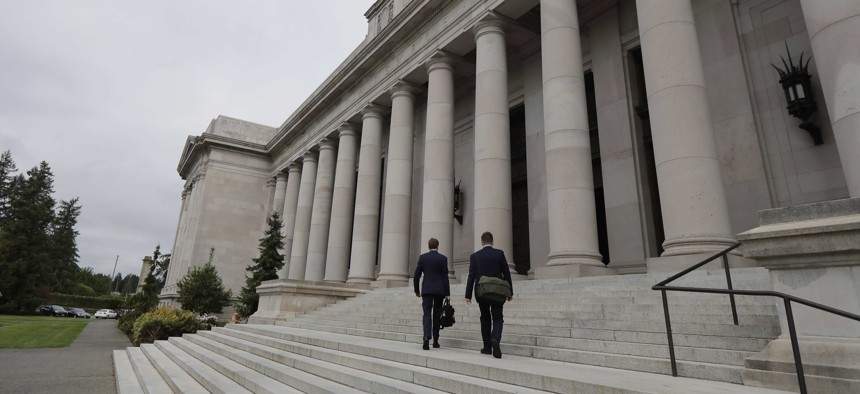Union Organizing Emails May Be Subject to Disclosure After State High Court Ruling

The Temple of Justice in Olympia, Washington. The state Supreme Court last week issued a ruling in a public records case related to union organizing. AP Photo/Ted S. Warren
A group often at odds with government labor unions says the case sets an important precedent for when correspondence about union activities is public record.
Emails related to union organizing that a professor at a public university in Washington state sent and received are not necessarily barred from disclosure under state public record laws, the state’s Supreme Court has ruled.
The Freedom Foundation, a think tank that frequently clashes with public employee unions up and down the west coast, began its attempts to obtain the emails nearly four years ago.
A University of Washington professor, who was president of the university’s chapter of the American Association of University Professors, sent and received the sought after messages, most of which are stored on government servers.
Although the case is not over, the foundation says the latest ruling sets a clearer precedent for when correspondence about union organizing should be considered a public record.
There are about 3,800 pages of documents that the parties in the case are fighting over.
Service Employees International Union 925 has pushed back in court against the release of the emails on the grounds that many are personal and not of public concern. Disclosing them, SEIU said, would chill union organizing, restrain speech and violate privacy rights.
A trial court granted the union’s motion to block the release of most of the emails. An appeals court affirmed that ruling last year.
But last week, the state’s Supreme Court reversed the appeals court decision. It said the appeals court had misapplied a legal test for determining whether the records should be restricted from release. The case will now go back to the trial court for further proceedings.
State Supreme Court Justice Debra Stephens wrote the unanimous 21-page opinion, which concerns Washington state’s relatively liberal public records statutes.
Writings that contain information relating to government conduct, functions or performance, and that are “prepared, owned, used, or retained by any state or local agency,” are subject to these laws.
In the 2015 case Nissen v. Pierce County, the Washington state Supreme Court held that records a public employee prepares, saves or uses on a private cell phone can be subject to public disclosure, if the records fall within the person’s “scope of employment.” The decision outlines standards for determining when records meet this criteria.
But Stephens’ opinion explains that this “scope of employment test” only applies to writings created on personal devices. The appeals court, she wrote, erred in turning to it in the UW case.
Her opinion notes that the UW email dispute is over messages mostly stored on a government agency’s servers. It also says the appeals court applied the scope of employment test in a way that conflicts with broader reasoning in the Nissen decision.
The Freedom Foundation has argued that emails about faculty organizing likely do relate to government functions because the messages are apt to discuss issues like working conditions and the role the state plays as an employer and educator.
In their opinion, the Supreme Court judges were receptive to this argument. “We agree that many of these emails likely relate to government conduct,” the opinion said.
As the state Supreme Court remanded the case to the trial court, it noted that the union still has other arguments against the release of the documents at its disposal that the lower court didn’t address in prior proceedings.
Bill Lucia is a Senior Reporter for Route Fifty and is based in Olympia, Washington.
NEXT STORY: Union-Backed Ballot Proposal Takes Aim at Self-Service Grocery Store Checkouts






